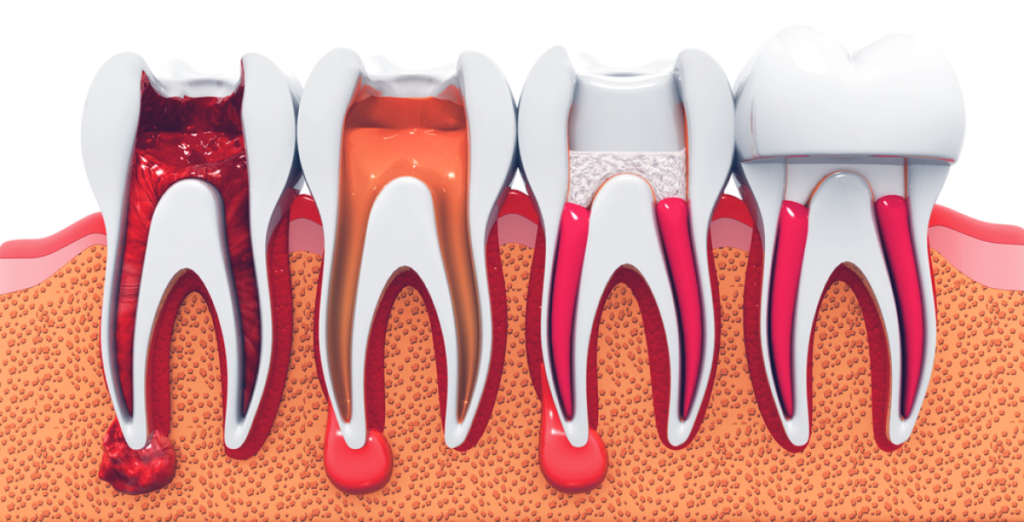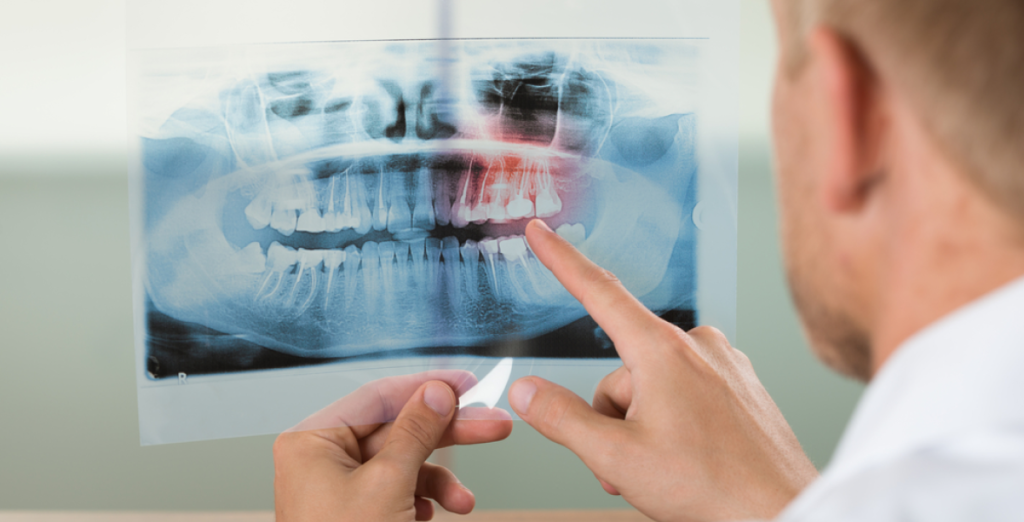This treatment is for you if…
You have a damaged tooth that affects the nerve.
What is root canal work?
Root canal work is a treatment for seriously infected or decomposed teeth whose cause stems from the tooth’s nerve. The treatment consists of repairing and saving the teeth by eliminating the tooth pulp, to then clean and seal the inside of the tooth. The dental pulp is the tissue inside the tooth, which contains blood vessels, nerves and connective tissue.
Performing root canal work on teeth in this state repairs the infected or abscessed teeth, infections that are characterised by inflammation and the accumulation of pus. It is also necessary when the teeth have already reached this point. These infections may be caused by tooth decay, cracks or fractures or repetitive dental procedures in teeth.
Some of the most common symptoms that lead to the need for root canal work are as follows:
- Pain
- Sensitivity to heat and cold on a prolonged basis
- Sensitivity to touch and when chewing
- Swollen gums and discolouration
Also, in some cases, the patient may not have any symptoms.

Pulp is necessary during the growth and development of the teeth. Once the tooth is already mature, it can live without the pulp, thanks to the tissue surrounding it. As for the nerve, it is not important for the health of the tooth, so not having it will not affect its daily functioning.
What types of root canal work exists?
To classify root canal work, it is important to take into account that not all teeth have the same number of roots or root ducts. These root ducts can be found in the teeth’s roots. Each tooth has at least one, but often the teeth have various ducts. Based on the teeth to be treated, root canal work is classified into unirradicular, birradicular and multirradicular.
Unirradicular root canal work
These are the root canal work procedures performed in teeth with a single root duct. Teeth such as the central and lateral incisors, the first and second lower premolars and the upper and lower canine teeth usually only have one root and, therefore, one root duct.

Birradicular root canal work
Procedures performed on teeth with two root ducts. Teeth such as the second upper premolars usually have two root ducts, although they only have one root.
Multiirradicular root canal work
Root canal work performed on those teeth that have three or more root ducts. Upper and lower molars usually have four root ducts, since they usually present two canals in their mesial root.
Despite the fact that most of the teeth usually have the number of root ducts described in each of the types, all the teeth may have anatomical variations. It is important that the dentist locates and treats all the root ducts to ensure that the root canal work is successful.
Advantages of root canal work
Root canal work is a treatment that enables an original tooth that is infected or decomposed to be cured or healed. The treatment is carried out quickly and scarcely without pain, and it has multiple advantages for the patient that decides to undergo it. Both in the long and short term. The main advantages of root canal work are as follows:
- Avoids the removal of a natural tooth. Root canal work enables seriously decomposed or infected teeth to be saved and repaired, enabling the patient to conserve their original teeth.
- Avoids halitosis and other consequences. Infected teeth may cause consequences beyond damage to the tooth itself, such as halitosis. Recovering an infected tooth is not only beneficial for that tooth, rather for the health of the whole of the mouth.
- It is a painless treatment. Root canal work is a treatment that scarcely causes pain to the patient during the process. Current technology turns it into a painless, quick and safe treatment. In fact, the pain usually occurs before the treatment, since infections and decomposition caused by tooth decay usually hurt.
- Recover chewing without pain. Damaged teeth can be sensitive on being exposed to hot or cold food and they are also sensitive to touch or the chewing of certain food. Root canal work enables the patient to eat with normality when the tooth has fully recovered.
- Prevents more expensive dental treatment. A decomposed tooth can lead adjacent teeth to move. Therefore, root canal work that recovers the health of a tooth can also prevent the need for more expensive treatments such as orthodontics in the future.
Root canal treatment phases
Root canal work is a treatment that consists of repairing a seriously infected tooth. The treatment has five phases, which begin with an X-ray and diagnosis of the patient’s state and ends when the tooth has already been restored. These are the five phases of root canal work:

1. X-ray and diagnosis. The first step of root canal work is to take an x-ray, which will help to assess the possible infection of the tooth pulp or nerve. This x-ray allows the dentist to make a diagnosis, which will decide what treatment is adequate.
2. Local anaesthetic. The root canal work begins with the use of local anaesthetic to numb the area. Moreover, a rubber dam is placed around the tooth to avoid saliva or blood entering while the root canal work is being carried out.
3. Pulp extraction. To access the nerve and the pulp chamber, the tooth is perforated. The pulp, the bacteria and the decomposed nerve tissue are eliminated from the tooth. Afterwards, the sides of the root ducts are scraped and filed. Once completed, the remains are eliminated with chlorhexidine or sodium hypochlorite.
4. Root sealing. Once the teeth have been fully cleaned and disinfected, the ducts will be sealed. A special paste is placed to seal it, together with gutta-percha, a rubber composite, in the root duct of the tooth.
5. Tooth restoration. Normally, teeth that require root canal work also have some kind of fracture or extensive tooth decay. Often it is necessary to place a crown, a post or another restoration device to protect the tooth and fully restore it. Both in terms of its chewing functions and at aesthetic level.
Frequently asked questions
Root canal work is a dental procedure that treats the inside of the tooth when the pulp is infected or damaged. It is necessary to save a tooth which, otherwise, would have had to be pulled out, eradicating the pain and preventing the infection from spreading.
The symptoms that may indicate the need for root canal work include intense tooth pain, prolonged sensitivity to heat or cold, swelling and the reddening of the surrounding gums. However, in certain cases, there are no visible symptoms, hence, it is essential for a dentist to perform an assessment.
Root canal work is generally performed using a local anaesthetic. The dentist or endodontist accesses the tooth pulp, withdraws the damaged or infected tissue, cleans and disinfects the space and then fills and seals it. Often a crown is placed to strengthen the tooth.
Although root canal work has a reputation for being painful, most patients find that the procedure is not very bothersome. The local anaesthetic minimises the pain during the treatment and any subsequent pain can usually be managed with painkillers.
The cost of root canal work varies according to the case and the type of root canal.work. You can consult Adeslas’s price list by clicking here.
Prices
The amounts indicated have been estimated in line with a full treatment, in accordance with the parameters in the table. Includes: study, treatment and check-ups during the treatment, so it serves as a guide and is of a merely informative non-contractual nature. The personalised treatment will be examined in line with the medical prescription. Prices can be increased if additional costs are incurred as a result of the requests made by each customer. Price valid until 31 December 2024 except in the event of a typing error.

